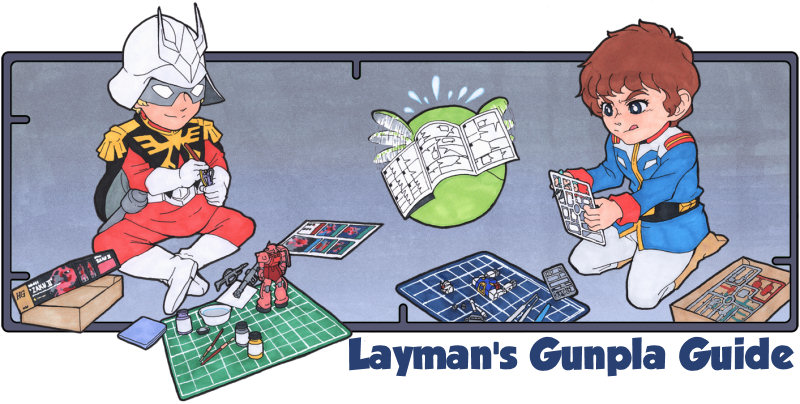It is as beneficial as it is troublesome in some aspect when it comes to modifications. Drilling a hole on it is easy mainly because it's soft, but because of that property, it's quite hard to enlarge the hole. It's easier to score and cut, but that easiness somewhat give it the disadvantage when trying to cut it precisely by freehand, as I was able to do so with regular PS armor parts. But, since it's still PS, cement remains the hero of the day.
Waist Not, Want Not. I modified the frame first to make extensions. I started with widening the shoulders by 5mm on each side. This was done by cutting the chest/shoulder frame near alongside the area where the shoulder armor is attached. This resulted in 3 pieces each for the back and front ends of the frame. I then rebuilt the frame, back parts first (waiting around an hour to let the cement set), so I can align the front parts freely as I add reinforcements using 1mm WHIPS and 2mm beams.
I then proceeded with the waist/abdomen extension, but this is in conjunction with the groin joint placement. I will "explain" the groin mod first and you will see why later on.
The groin joint of the Marasai, like that of the Zaku 2.0 is a side swivel and not a center swivel like that of the MG SInanju and the MG Hi-Nu. It also does not have front<>back swivel like the Hi-Nu and The O does (as well as some HG kits), which changes the kit's upper body equilibrium point from front-heavy<>back-heavy. This is a bit problematic for me, since I plan to give the Haribon some heavy backpack additions. The detail of the groin part does indicate that it should have that feature.
Simply turning the leg/groin joint won't work, as it will put the thigh way up front into the front skirt's domain, so a radical, but simple mod is needed. I had to cut the whole groin placement section and reverse its placement relative to the front of the groin assembly.
I then rebuilt the part by sandwiching WHIPS and beams within the inner section to act as dovetails for the outer section to hold on to. When this was done, as I mentioned earlier, I cut the ball part of the waist/abdomen joint, drilled a 2.8mm hole into the ball, stuck a 5mm<1cm>5mm piece of 5mm round beam, with ends shaved down to 3mm. I also mentioned earlier that the frame material act as if it was polycap material, so I'm careful to make the hole big enough for a snug fit, because the material will do the rest. When done correctly, the mod can stand without cement, but, I wasn't going to take any chances especially with high tension parts.
As such, this is a 2-4-1 modification.
Height comparison with the Shin Matsunaga Zaku.
Thigh high. With the waist/groin modification curing, I proceeded working on the thigh extension. I had lofty ideas of cutting the lower peg that connects to the thigh away and extending it at the middle, and extending the thigh frame itself, but I guess my experience with the Bathala's modifications learned me a thing or two about thinking out of the box to see a simpler and faster solution.
And give me one it did. Instead of doing either, I kept the peg intact, and instead cored it (I cemented the parts together first, stuck a 5mm<2cm length of 5mm beam, and encapsulated it with an 8mm clear pipe with a 5mm~ inside diameter (Note, these pipes I've had since I started heavy mods 3 years ago). The extended peg goes way into the thigh frame, and since it's held only by a 2mm thick PC part, it's a bit too wobbly for comfort (I exaggerate, it's not really that wobbly, but I'm not taking any chances), I reinforced one side the inner section of the thigh with another piece of 8mm pipe, to "hold" the extended peg within the thigh.
Ankles Away. Though extending the thigh didn't visually drastically affect the proportion (at least to me, because of the Marasai's huge feet, and you know what they say about huge feet), I "cheated" by extending the ankle joint instead of the leg, and will later thicken it up.
I'll instead lengthen the armor parts, or, I might just cover them up with "feathers" similar to the scales I did on the Ronin, but longer, or I might not use them at all for an exposed frame effect with a few details here and there.
Height comparison, with the Zaku, and my headless, dilapidated Zeta A1 (this proves Gunpla ARE NOT TOYS, especially since I wasn't even playing with any of them).
That's it for now...



No comments:
Post a Comment